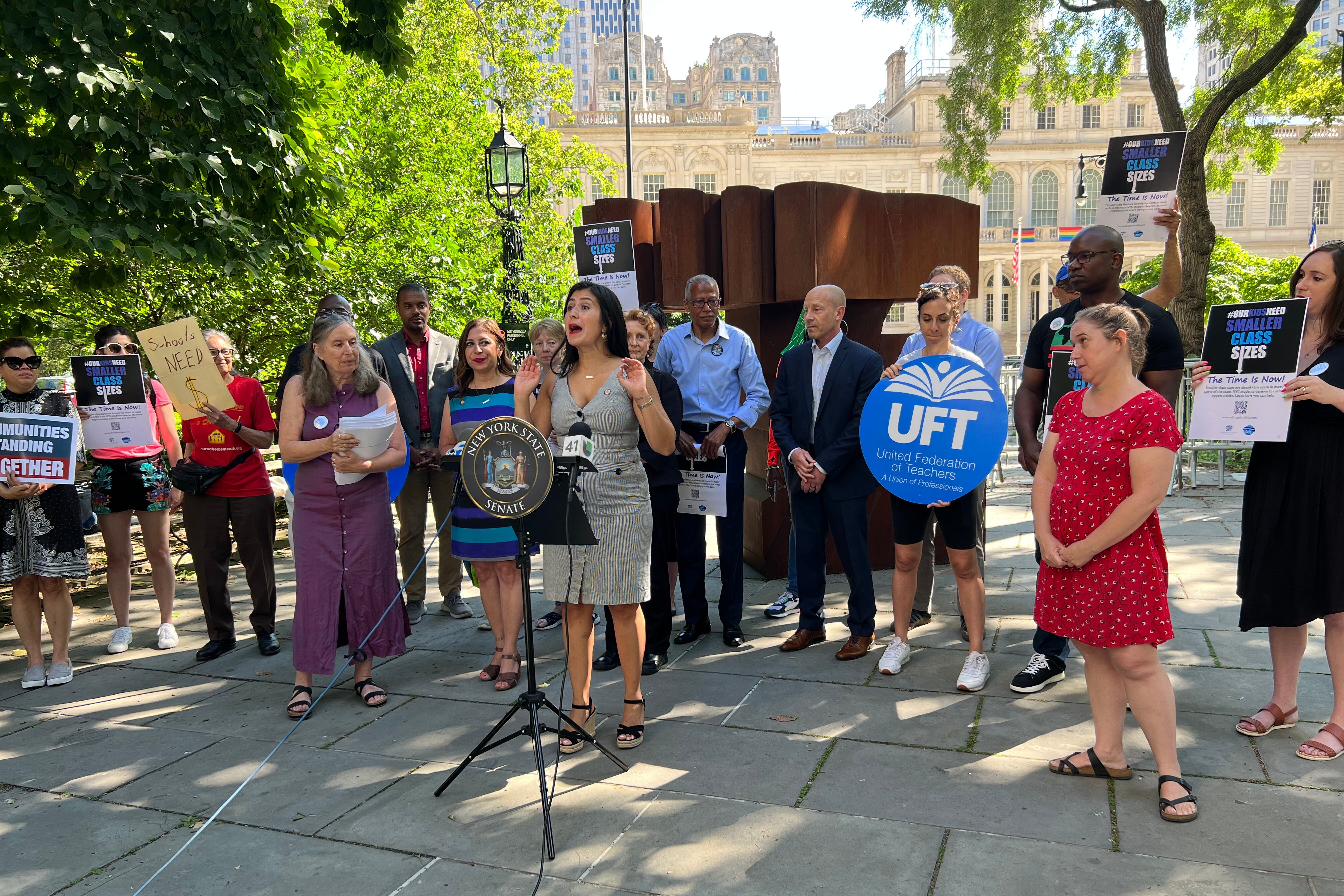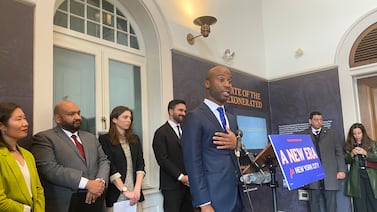Angry lawmakers, parents and advocates rallied Wednesday in City Hall Park, calling on Gov. Kathy Hochul to sign a bill forcing New York City to lower class sizes.
Separately, Hochul had yet to sign a bill extending mayoral control of New York City’s schools the day before it expired — though that caused no outcry.
If mayoral control sunsets on Thursday, the city would have to reinstate the former system of 32 community boards, as well as a citywide Board of Education.
State legislators earlier this month approved both bills as part of a package deal to extend mayoral control for two years.
The bill to shrink class sizes, which passed nearly unanimously, is popular among families, advocacy organizations, and the city teachers union. But city officials oppose it because of the price tag.
The bill to extend the mayor’s powers, such as his ability to handpick the chancellor, saw less support. That bill makes several tweaks to the system to water down some of the mayor’s influence over the city’s Panel for Educational Policy, a board whose members are largely appointed by the mayor. The board approves major contracts, as well as school closures and the city’s school funding formula.
Mayor Eric Adams and schools Chancellor David Banks oppose both bills.
It might not be unusual that Hochul hasn’t yet signed the bills. Queens Democratic Sen. John Liu, a chief sponsor of both bills, said it is “common practice and etiquette” for the legislature to allow the governor to request passed legislation between June and December, because she has hundreds of bills to review.
But Liu saw no reason to delay signing the class-size bill.
“We aren’t negotiating amendments because the bill passed nearly unanimously in both chambers, and signing it as is, is the right thing for the governor to do in order to finally fulfill the promise of a sound basic education for all New York kids,” Liu said in a statement to Chalkbeat.
His office declined to answer why the mayoral control bill hadn’t been signed.
In a statement, Hochul spokeswoman Hazel Crampton-Hays said the governor has “consistently supported mayoral control and is committed to helping ensure that every student in New York receives a world-class education, and we are reviewing these pieces of legislation.” She did not answer questions about if or when Hochul plans to sign either bill.
Smaller class size
The class size bill requires the city to limit classes over the next five years to 20 students in kindergarten through third grade, 23 students for grades 4-8, and 25 students in high school.
As of this school year, classes averaged roughly 25 students across the five boroughs as budgets were flushed by federal stimulus dollars as well as increased state funding despite declining enrollment. Now, however, many educators and families fear that class sizes will grow as the city is cutting hundreds of millions of dollars from school budgets because of the continued enrollment declines projected for next year.
The bill requires the city to begin planning for smaller class sizes in September and submit an annual report to the state showing its progress on meeting the class size requirements. But they can also apply for exceptions, such as “severe economic distress” and space issues, which must be agreed upon with educator unions.
Liu’s office declined to respond to questions about the exceptions and to what extent the city can use them.
State lawmakers, already frustrated about budget cuts to schools, implored Hochul to sign the bill during Wednesday’s press conference near City Hall.
Brooklyn Sen. Jabari Brisport, a former teacher, said smaller classes would lead to better academic outcomes and social-emotional health for students.
“That money needs to go toward more classrooms and more teachers, and yet what we have now is a recently passed city budget that reduces funding and where teachers are being excessed or let go,” Brisport said.
Research shows that students often perform better in smaller classes, but there’s no agreement on how much better. Some researchers and policymakers have questioned whether funding could be used differently to boost student performance. But in New York, the bill to shrink class sizes passed with nearly no opposition.
Manhattan State Sen. Robert Jackson said he didn’t know why Hochul hasn’t called up the bill yet, but he suggested that Adams — who recently endorsed Hochul for her successful Democratic gubernatorial primary — is pressuring her not to sign it.
Amaris Cockfield, a spokesperson for City Hall, declined to comment when asked if Adams has been lobbying for the governor to veto or amend the bill.
City officials have complained that the class size bill does not come with additional funding, and they estimated that it would cost at least $500 million more annually, just to reduce elementary and middle school classes. This, they said, will result in cutting other services for students, such as school social workers.
State lawmakers have pointed to recent, historic increases in the state’s main funding formula for schools that should go toward this endeavor.
The Citizens Budget Commission, a fiscal watchdog, has also called for the governor to veto the bill, raising concerns over its cost as well as whether classes would shrink small enough to actually result in better student performance.
Union officials have estimated the cost at $200 million more a year over the next five years, eventually costing $1 billion annually. They said that the bill would not force the city to greatly expand its footprint for school buildings. After reviewing building space surveys, union officials believe 90% of schools could accommodate smaller classes within existing building space, including in “nontraditional” classroom space.
Mayoral control
Lawmakers appeared less concerned, if at all, about the lapsing of mayoral control of New York City schools if Hochul doesn’t sign the bill into law before Thursday, when it officially expires.
An education department spokesperson did not immediately comment on what would happen if the mayoral control bill languishes and the governance system expires. Cockfield, of City Hall, declined to comment on any lobbying Adams may be doing over the bill.
After Adams and Hochul had sought a four-year extension, the mayor blasted lawmakers for being “professional naysayers” after it passed with only a two-year extension. The bill also increases the number of members on the Panel for Educational Policy, and gives them fixed terms, so the mayor cannot remove someone for voting against his wishes. Those changes put “more bureaucracy in the way of making real change for kids,” Banks said at the time.
Mayoral control briefly lapsed in July 2009 under former Mayor Michael Bloomberg. City officials were required to reconvene the citywide Board of Education, which has the power to select a chancellor. With five appointments made by borough presidents and two by the mayor, the reconstituted board unanimously voted to keep then-Chancellor Joel Klein in place.
The month-long expiration appeared to cause little disruption to schools, but if it lasted any longer, it could have caused chaos. The city must eventually begin to revive the individual 32 boards of education.
Reema Amin is a reporter covering New York City schools with a focus on state policy and English language learners. Contact Reema at ramin@chalkbeat.org.






